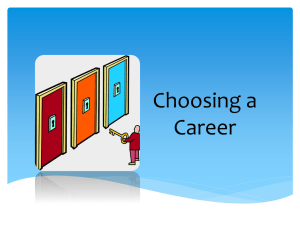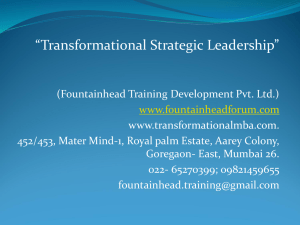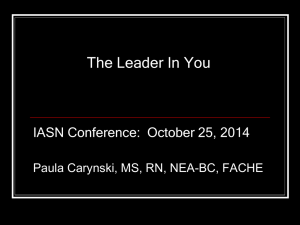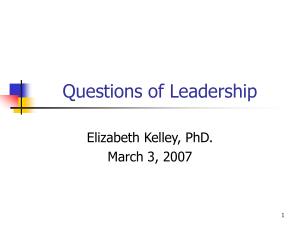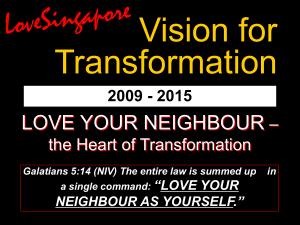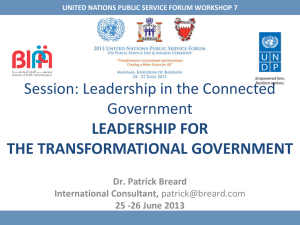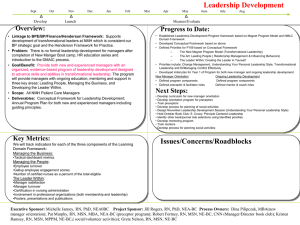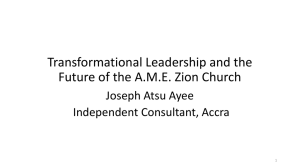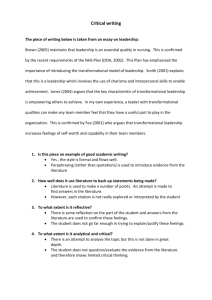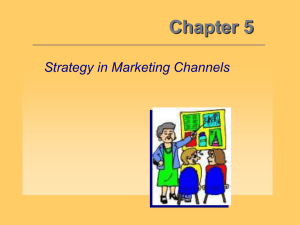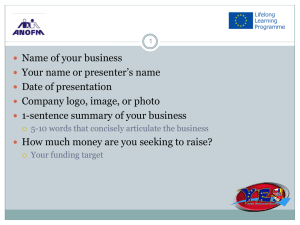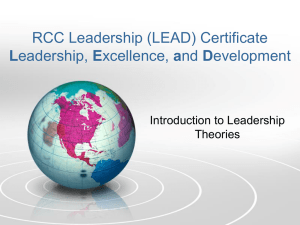change the boundaries
advertisement
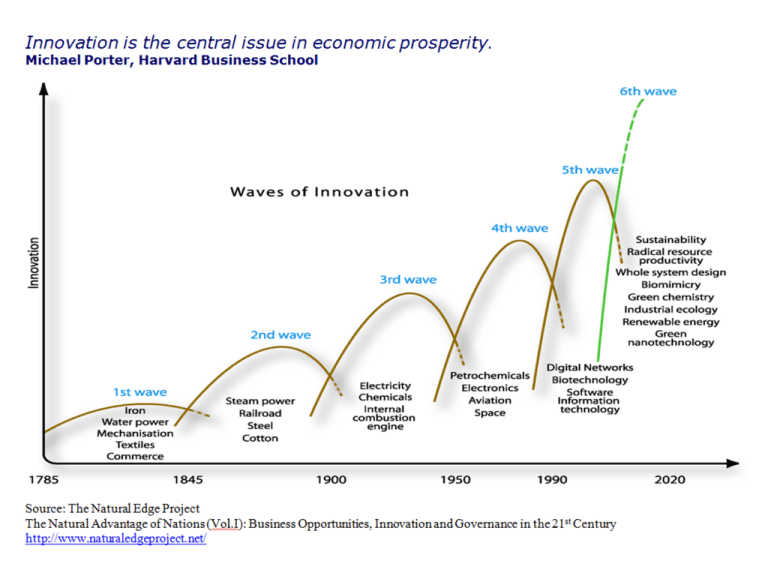
The Three BIG Patterns are: 1. CUSTOMER EXPERIENCE SHIFT eg Starbucks The Three BIG Patterns are: 1. PLATFORM SHIFT eg Amazon The Three BIG Patterns are: 1. BUSINESS MODEL SHIFT eg Zipcar, uber. CHOOSING THE RIGHT APPROACH (Business Model / Platform / Customer Engagement) ? Use Business Model Innovation when : • Part of your business offering is over/under valued. • Large group of potential customers cannot afford your offering. • Not much variation in industry (in relation to business model). • Assets in business can be restructured indifferent economic model. • Internal business systems are strong on reliability, flexibility, value delivery. • Profit model changes have benefit for customer and business. CHOOSING THE RIGHT APPROACH (Business Model / Platform / Customer Engagement) ? Use Platform Innovation when : • Customers have to show considerable skill/ persistence to get problem solutions. • A group with similar needs/ideas exists without a forum/hub for them to unite. • Demand for a complex set of assets/capabilities exists – too difficult to meet. • It is possible for businesses to combine and allow access to each others assets. • It is possible to co-opt customers, competitors to ‘work for’ your business. • There are ways to expand/extend/diversify current business offering. CHOOSING THE RIGHT APPROACH (Business Model / Platform / Customer Engagement) ? Use Customer Engagement Innovation when : • Complaints about service and/or low customer expectations are ‘normal’. • Many potential customers are not active in market due to poor service. • Business models have punitive switching barriers, try to get customer ‘lock-in’. • A different buying model/experience can be found (compared to existing). • Engagement through values, sense of self, connections to community is possible. • Excellence on one market can be transferred to another market. CORE – change the known - one or two types involved – low risk and reward. - works best if the business is already a leader in that market – usually minor product improvements to existing range/same customer base. ADJACENT – change the boundaries – three of four types involved - higher risk and reward. - reframing offering to significantly shift customer expectations / value delivery. - Can bring years of advantage by ‘resetting’ market boundaries. eg Method – cleaners as ‘household fashion aesthetic’ TRANSFORMATIONAL - change the game – five or more types involved –high risk and reward. - market maker/ breaker affecting existing markets –may create new businesses. - big effect on customer and competitors. eg iTunes –digital music & movies sales. CHOOSING THE RIGHT LEVEL OF INNOVATION AMBITION (Core /Adjacent /Transformational) ? Use Core innovation when :• Business is already strong in market with products leading growth. • Competitors are focused on product performance – other possibilities exist. • Market has not much innovation /excitement, and has high barriers to entry. • Cash flow is important – short term gains needed. • Assets & capabilities already in place to drive the innovation. • Low risk tolerance or low innovation capability in business. CHOOSING THE RIGHT LEVEL OF INNOVATION AMBITION (Core /Adjacent /Transformational) ? Use Adjacent innovation when :• Existing offerings not showing growth, due to strong competitive pressure. • Competitors using one/two types of innovation outside product performance. • Market is mature/declining – need to make changes or exit. • Need significant returns on modest investment, but can allow time to develop. • Ability to repurpose assets, further invest for flexibility etc exists. • Business is ready for change (risk, opportunity, new markets etc) CHOOSING THE RIGHT LEVEL OF INNOVATION AMBITION (Core /Adjacent /Transformational) ? Use Transformational innovation when :• Dramatic growth increase needed – need for fundamental changes understood. • Competitors increasingly active – market structure change may overcome this. • Market is mature/declining, low barriers to entry, boundaries blurring. • Time for major change to happen exists, radical new growth needed. • All existing assets and capabilities are up for review / redeployment / redundancy. • Both business offering and market served may change completely. INNOVATION Strategy is found by combining the approach : - Business Model Shift Platform shift Customer engagement Shift With the scale /size of innovation : - Core - ‘change the known’ Adjacent – ‘change the boundaries’ Transformational – ‘change the game’ and using innovation tactics – see handout. IN GROUPS OF FOUR Recommend a strategy for ONE of a) A corner dairy in Auckland b) A video rental business c) A hotel in Queenstown
